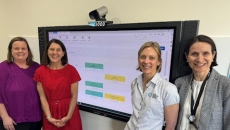Patient Engagement
With help from a new point-of-care tool, even its lowest-performing clinics for diabetic retinopathy have met their retinal exam percentage completion goal.
Also: NIH awarded Mount Sinai researchers $4 million to develop an artificial intelligence-powered model to detect adverse outcomes of obstructive sleep apnea.
Market forces shape health tech innovation, but the most transformative startups have a keen understanding of adoption patterns and change management at the organizational level, says Sally Ann Frank in advance of her HIMSS24 presentation.
Also, Aster CMI Hospital's Neurology Department has developed a new AI solution for detecting Carpal Tunnel Syndrome.
But the hospital says the call center established after the attack cut access to patient records and billing systems is still the best way for patient families to reach providers.
At HIMSS24, Southcoast Health's Jim Feen will discuss how IT-enabled service centers can be a "game changer" for consumers and offer sizable competitive advantages for health systems. He'll offer tips for designing them and KPIs to track their outcomes.
Dr. Manish Gupta and Harshal Sanghav of the Florida Atlantic University Charles E. Schmidt College of Medicine discuss the challenges of AI rollouts in clinical care and review how the health system uses patient pre-performance data for surgical planning.
The artificial intelligence-powered app gives families real-time updates on wait times, labs and imaging results, and tracks progress toward discharge during pediatric emergency visits.
The Seoul National University Bundang Hospital has been successful in meeting the HIMSS standard for the fourth time since its achievement back in 2010.
The Commission on Excellence and Innovation in Health reflects on their first go-live of the South Australia Statewide Patient Reported Measures Program at The Queen Elizabeth Hospital.







